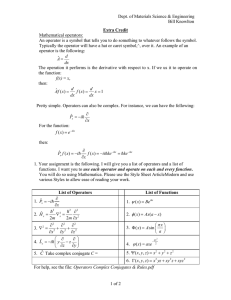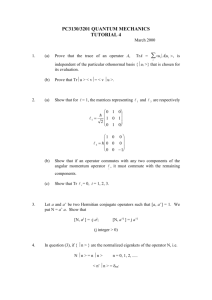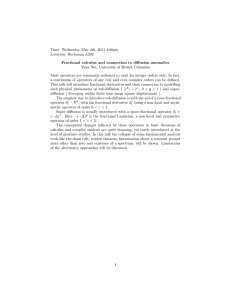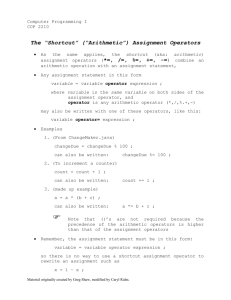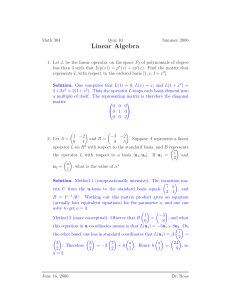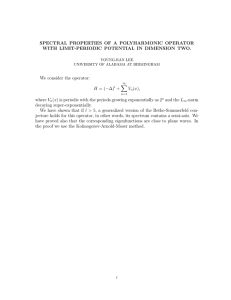PHYSICAL PLANT OPERATING POLICY AND PROCEDURE PP/OP 08.02:
advertisement
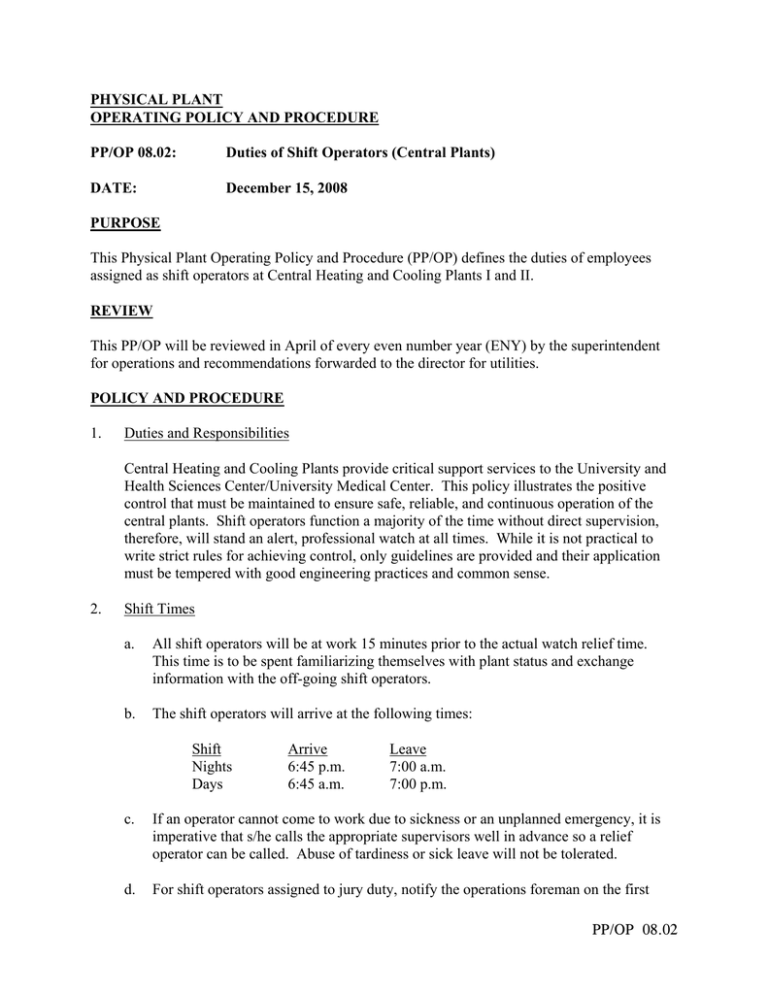
PHYSICAL PLANT OPERATING POLICY AND PROCEDURE PP/OP 08.02: Duties of Shift Operators (Central Plants) DATE: December 15, 2008 PURPOSE This Physical Plant Operating Policy and Procedure (PP/OP) defines the duties of employees assigned as shift operators at Central Heating and Cooling Plants I and II. REVIEW This PP/OP will be reviewed in April of every even number year (ENY) by the superintendent for operations and recommendations forwarded to the director for utilities. POLICY AND PROCEDURE 1. Duties and Responsibilities Central Heating and Cooling Plants provide critical support services to the University and Health Sciences Center/University Medical Center. This policy illustrates the positive control that must be maintained to ensure safe, reliable, and continuous operation of the central plants. Shift operators function a majority of the time without direct supervision, therefore, will stand an alert, professional watch at all times. While it is not practical to write strict rules for achieving control, only guidelines are provided and their application must be tempered with good engineering practices and common sense. 2. Shift Times a. All shift operators will be at work 15 minutes prior to the actual watch relief time. This time is to be spent familiarizing themselves with plant status and exchange information with the off-going shift operators. b. The shift operators will arrive at the following times: Shift Nights Days Arrive 6:45 p.m. 6:45 a.m. Leave 7:00 a.m. 7:00 p.m. c. If an operator cannot come to work due to sickness or an unplanned emergency, it is imperative that s/he calls the appropriate supervisors well in advance so a relief operator can be called. Abuse of tardiness or sick leave will not be tolerated. d. For shift operators assigned to jury duty, notify the operations foreman on the first PP/OP 08.02 Page 2 working day after receipt of the summons for the scheduled jury duty. If the summons date conflicts with the operators scheduled shift, either before, after, or during a shift, the operator will be assigned to “day” working hours (7 a.m. - 4 p.m.). The operator will then be allowed the time off for jury duty. 3. Watch Relief a. Control of the plant by the shift operators must be based on full awareness of the current plant status and the evolutions taking place within the plant. Only with awareness can it be ensured that the plant is being operated safely and efficiently. The shift operators must be prepared to detect and deal promptly with problems as they arise. This plant awareness must be established before the watch is assumed. b. The objective of the plant tour is to obtain, by first hand observation, a clear understanding of plant conditions and its capabilities to accomplish planned operations. Ideally, the prewatch tour should include a detailed inspection of the entire plant, including each piece of equipment, each log, and each valve and switch. Obviously, such an approach is impractical; however, the lead operator should attempt, at a minimum, to verify that plant status is accurately reflected in the documents reviewed and to observe general condition of the plant. Extent of the tour should be determined by the number of changes that have occurred, the time elapsed since previous watch, and objectives of the present watch. c. Watch relief is the final step in gaining and understanding of plant status prior to assuming control. During watch relief, the on-coming lead operator must resolve any questions that may have arisen during the plant tour or review of logs. d. Shift operators will report to work sufficiently rested and without any physical or mental impairment that would prevent the performance of all duties. e. Watch relief is a formal, controlled evolution. The objective of watch relief is to give the on-coming watch a complete understanding of plant status. Before relieving the watch: (1) Inspect the plant. Remember, once the watch is relieved, responsibility is accepted for the plant, as is. (2) Read and initial the Night Orders to ensure that the previous shift fulfilled their responsibilities and that the oncoming shift can fulfill their duties. (3) Review all plant operating and water chemistry log sheets for abnormal readings and developing trends from the last time on shift. (4) Read the Daily Chronological Log completely from the date of the last shift PP/OP 08.02 Page 3 worked to be aware of any changes or conditions that may affect operating the plant. (5) Review Alarm Summary screen. (6) Review the plant’s Equipment Out-of-Service Sheet for equipment availability. (7) Communicate and exchange pertinent information with the off-going shift operators and ensure all questions are resolved. (8) If conditions are noted that prevent watch relief, the lead operator should take the following action: (9) 4. (a) Minor—Have the off-going shift correct the situation or discrepancy; or note the condition in the chronological operating log and elect to relieve the watch and correct the situation. (b) Major—Inform the off-going shift that the shift cannot be relieved and the reason why. Immediately notify the appropriate supervisor. Last Daily operating log entry per shift will be – “Relieved by (signed by Lead Operator taking watch)” Watch Standing a. Knowledge of all plant systems is gained through positive participation in Personnel Qualification System (PQS). The knowledge must be kept current and continually upgraded by constant review of plant systems and regular attendance at weekly training sessions. System knowledge refers not only to system details, but also to understanding how each system can affect overall plant conditions. Such study will bring about the essential sound understanding of system interrelationships necessary for watch control. Assisting the “B” operator in his training is a good means to this end and a major duty of the Lead Operator. b. Sound engineering judgment is the ability to determine which aspects of the total plant situation requires attention or action at a given moment. Obviously, even the most capable plant operator cannot follow everything in detail. Rather, the operator’s function is to monitor indicators that give the best picture of plant performance and can be most effectively monitored for the existing plant conditions. These indicators could include everything from communication to plant instrumentation. Always remember the cardinal rule of good watch standing, "Believe Your Indications." c. Formality on watch promotes safe and efficient operation and ensures more alert and businesslike operators. Formality is best taught by example. The Lead Operators PP/OP 08.02 Page 4 must demand formality and set the standard. Examples of formality will include but are not limited to: The use of written operating procedures for operation of equipment, strict adherence to written Physical Plant Operation procedures, e.g. Tagout and watch relief, and proper use of radios and communication equipment. d. Shift operators are expected to use breaks to control the monotony of the shifts. They will be managed so that proper monitoring of plant operation is maintained at all times. e. The Lead Operator and the Assistant Operator are a team and will function as such with the Lead Operator being in charge of the operating shift. f. The shift operators will stand a proper watch, remaining ever alert to the condition of all equipment. All standing orders, night orders, appointed rounds, and special instructions will be carried out in their entirety in accordance with good engineering practices. g. During each shift, time is intentionally allowed for training. Each operator is responsible for his/her own progress in training with the Lead Operator being tasked with training the Assistant Operator. Training may take the form of hands-on operation, tracing plant systems, discussions, or study of training materials. Additionally, the Lead Operator determines the requirement for his assigned Assistant Operator to attend scheduled formal classroom training. h. During an assigned shift, shift operators will not possess any object or material that would interfere with the proper performance of the required duties. This includes, but is not limited to, reading material, TVs, radios, video games, and Internet sites not directly related to training for improvement of professional skills as an operator. i. Shift operators will not absent themselves from their assigned facility, place of duty in that facility, allow themselves or other shift operators to fall asleep, or any other conduct that would prevent the standing of a proper, alert watch. Museum tour and well water PMs are included in shift duties. j. The Section of Utilities has a ”Zero Tolerance” for any disk or CD from home being installed in any TTU computer. k. At the end of each shift week, the Lead Operator will fill out a “B” operator evaluation form. This form will include PQS progress, positive and negative tendencies, and any other details needed to properly inform supervisors of the “B” operators progress in their ability to operate the plant in a safe, reliable, and efficient manner. 5. Daily Operating Log a. A chronological log should provide the plant with the ability to produce a viable PP/OP 08.02 Page 5 record of operation and performance that is useable for operation and maintenance of the utility plant on a day-to-day basis. b. To achieve its overall intent, a log must be: (1) Historical, chronological, and current. Entries will be made as soon as possible after they occur. (2) An objective and factual account of all personnel efforts, communication, occurrences, and observations within a given sphere of interest. The account should tell the “whole story” from start to finish, including indications, actions, root cause, follow up actions, and any other details required to fully explain the series of events. (3) A tool by which progress and performance may be measured and difficulties, incidents, and occurrences analyzed and evaluated, reconstructed, or accurately demonstrated. (4) A means of communication. c. The chronological log entries should be complete and typed in full sentences. d. Make log entries in RED ink or highlight out of specification readings, abnormal conditions, or evolutions that may affect the normal operation of the plant. 6. Plant Operating Logs/Indications/Trend screens, Alarm screens a. Operating logs are important because they provide a means of ensuring frequent observations of the operating equipment and systems by the operator. With preselected items to be logged, the operating logs can ensure that adequate parameters are observed on each piece of equipment or a system in the plant. b. Operating logs provide the basis for performance analysis of equipment and systems. The importance of the monitoring of logs, graphs, alarm screens, and other indications in the plant cannot be overstated. Knowledge of the plant operating characteristics, attention to detail, review of equipment and water chemistry operating trends will often lead to corrective action initiation before performance of plant equipment deteriorates to an unsatisfactory level. 7. Disciplinary Action Immense trust is placed in the operators to perform their duties in a professional manner. Failure to discharge these duties as evidenced by violation of applicable University, Physical Plant or Utilities’ rules, regulations, or operating procedures is a violation of this PP/OP 08.02 Page 6 trust. Violators will be recommended for discipline in accordance with the following Offense Discipline 1st Letter of Reprimand placed in employee’s personnel file. 2nd Formal Letter of Reprimand and one year administrative freeze on promotion or merit pay increase. 3rd One Day Disciplinary Leave Without Pay and one year administrative freeze on promotion or merit pay increase. 4th Three Day Disciplinary Leave Without Pay and demotion to the next lower pay grade. 5th Recommend termination. While disciplinary actions are normally in accordance with the above table, severe and/or flagrant violations will be dealt with accordingly. NOTE: The Lead and Assistant Operators are expected to function as a team, and will be held accountable as a team for both award and discipline issues; therefore, when one is guilty the other is subject to disciplinary action even if to a lesser degree. RESPONSIBILITIES POSITION SECTION MONTH Superintendent for Operations Review Apr (ENY) Approved:________________________________ Reviewer Approved: _______________________________ Director for Utilities PP/OP 08.02
